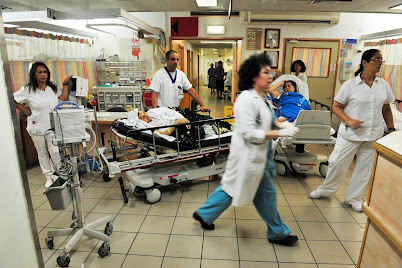Emergency Room Triage Market Growth is Accelerated by Adoption of Advanced Triage Systems
Emergency room triage involves sorting and prioritization of patients based on the severity of their injuries or illness. Advanced triage systems incorporate predictive analytics, risk stratification algorithms and electronic health records to aid clinical decision making and optimize workflow in emergency departments. These systems help identify critically-ill patients, reduce waiting times and ensure timely intervention. For instance, advanced virtual triage tools use patient health data and symptoms to derive a preliminary diagnosis and triage level remotely, even before reaching the hospital.
The global Emergency Room Triage Market is
estimated to be valued at US$ 3.1 Bn in 2023 and is expected to exhibit a CAGR of 6.6% over the forecast period
2023 to 2030, as highlighted in a new report published by Coherent Market
Insights.
Market key trends:
The
increased adoption of advanced triage systems in Global
Emergency Room Triage Market Size has been a key trend driving market
growth over the past few years. These systems leverage technologies such as
artificial intelligence, machine learning and the internet of medical things to
streamline triage workflows. For example, AI-powered imaging analytics and
computer vision help interpret medical scans and X-rays for prompt diagnosis
and triage decisions. Furthermore, predictive models using EHR data detect
deterioration in patient condition in real-time and alert clinicians
proactively. The integration of triage systems with eTriage platforms also
allows remote clinical evaluations via video and improves access to specialist
care. Overall, the implementation of digital solutions is optimizing emergency
response, enhancing patient safety, and fueling revenues in the emergency room
triage market.
Segment Analysis
The
global emergency room triage market is segmented based on type, end user, and
region. Based on type, the market is segmented into emergency care pathways
(ECP), triage track, and others. The triage track segment is expected to
dominate the market during the forecast period. The triage track helps in
prioritizing patients on the basis of acuity (illness severity) and informs
patients about their estimated wait times. This provides convenience and better
healthcare experience to patients.
Key Takeaways
The
global Emergency Room Triage market is expected to witness high growth during
the forecast period of 2023 to 2030. The market size is projected to increase
from US$ 3.1 Bn in 2023 to over US$ 5.2 Bn by 2030, expanding at a robust CAGR
of 6.6%.
Regional analysis: North America dominates the global emergency room triage
market currently and is expected to continue its dominance during the forecast
period. The presence of advanced healthcare infrastructure and adoption of
technologically advanced triage systems are major factors contributing to the
large share of North America. Asia Pacific is expected to be the fastest growing
market during the forecast period owing to rising healthcare spending and
increasing cases of chronic diseases and injuries in densely populated
countries such as India and China.
Key players: Key players operating in the emergency room triage market are
Novartis AG, Gilead Sciences, Inc., Castle Creek Biosciences, Inc., Lineage
Cell Therapeutics, Inc., Transgene SA, Cellectis, ImmunityBio, Inc., Sorrento
Therapeutics, bluebird bio, Inc., Arcellx, Sana Biotechnology, Inc., Biodesix,
Inc, and Laurus Labs. Novartis AG and Gilead Sciences, Inc. currently hold a
major market share. Key players are focusing on strategic partnerships and new
product launches to strengthen their market position. For instance, in 2021,
Biodesix launched its GeneStrat test which helps clinicians to predict tumor
response to immunotherapy drugs.




Comments
Post a Comment